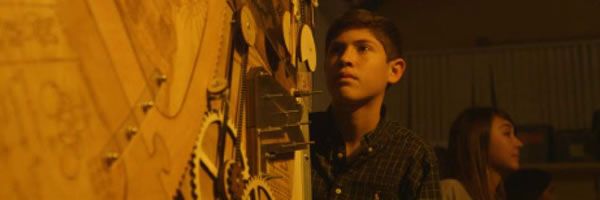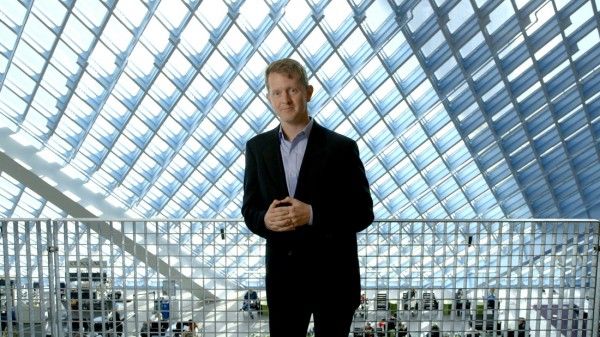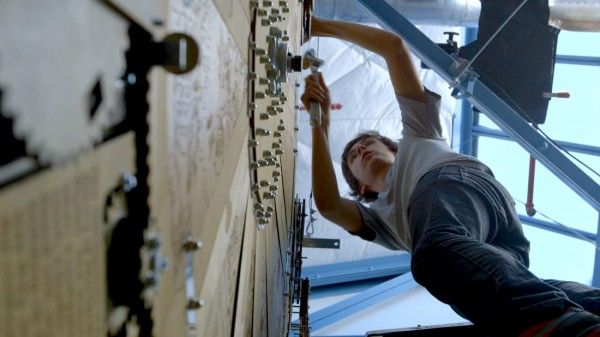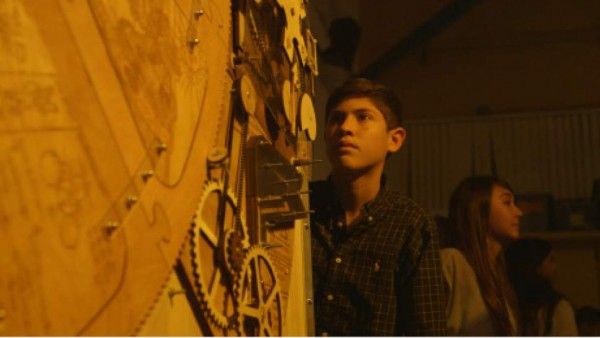The American education system is fucked. It’s outdated, it’s stifling, and the political response—forcing students to excel at standardized testing—has failed spectacularly. We desperately need a drastic change, but what’s the solution? Greg Whiteley’s documentary Most Likely to Succeed believes the answer lies in a single high school in San Diego—High Tech High. However, despite saying early in the film that the problem with standardized testing is that everyone learns differently, Whiteley remains tethered completely to High Tech High as if its teaching model should provide the new model for all education. However, his limited scope not only turns the film into what feels like a promotional video for a single school, but it also misses the point of traditional education.
After learning that his 10-year-old daughter no longer cares about school, Whiteley sets out on a quest to figure out why we still follow a model of education that’s existed since 1843. He sharply and entertainingly lays out the history of American education and how it’s shaped to create obedient citizens, specifically ones suited to the industrial age. But now we’ve moved out of the industrial age into the information age, and Whiteley argues that income inequality and the lack of jobs for college graduates is a result of our poor education model and the inability to compete with computers, although his examples don’t come from business but from Deep Blue and Watson, which were good enough to win at chess and Jeopardy!, respectively. If we don’t change the way we teach, Whiteley argues, then computers will take all of our jobs, so the only way to compete is to learn skills like abstract reasoning, leadership, and cooperation.
As I said, our current public education system is incredibly flawed at best and an outright failure at worst. However, it pursues the same goal as Whiteley, which is that education should create competitors and Productive Members of Society™. Learning to develop a life-long love of learning is never mentioned. It’s about “skills” as if computers can’t learn skills. And if we just break away from standardized testing and move to a more abstract, unconventional mode of learning, we’ll have this whole education thing licked.
I agree that standardized testing is the worst, but to say that our current model of teaching lacks any merit whatsoever is to insult students who find test-based learning to be valuable. In one of the few times Whiteley breaks away from the perceived Mecca that is High Tech High, he interviews high school students who like tests. These students are treated as quaint and their views are “interesting”, as if a set curriculum and conventional lesson plan are ridiculous.
Whiteley points out that since students who attempt to ace a standardized test have a poor retention rate, this kind of learning is a failure. But Whiteley falls into the same fallacy as any mopey teenager who says, “I’m never going to need this in the real world anyway!” This line of thinking believes that if you don’t retain the information you learned in algebra, then that subject (or at least the way we teach it) is worthless. Except what we’re learning isn’t really math, but problem solving, which is something that everyone uses in every day life. The lesson isn’t “2x + y = 37”; the lesson is how you persevere at something you might not understand or even particularly like, but you do it anyway.
The other criticism of the old model is flawed is that current curriculum covers too much. Whiteley criticizes AP History because it tries to teach a wide span of centuries rather than focus on a shorter timespan. But I took AP History, and you can argue that if we had focused on one or two specific eras, I might possibly know more about those eras. But if I hadn’t learned a longer timeline, then I would be denied investigating more history. I love history, and part of that love came from my World History teacher’s willingness to take us from the early 10th century to the end of the 20th century. To be clear, I was lucky enough to attend a private school where teachers had the freedom to come up with fun projects and didn’t teach to a government-issued standardized test, but we also took notes and tests on what we studied.
By focusing solely on High Tech High, Whiteley dismisses any other kind of schooling that even remotely uses an old mode of education. Instead, we’re supposed to be enamored of how 9th grade students are able to blend a history lesson with physics to make an impressive project. And the final result is impressive, but we also never see one unhappy student. There’s not a single person at High School High who feels frustrated with the assignments. The only student who struggles isn’t depicted as being upset; he just has high ambitions and needs to find a way to reach them. I celebrate High Tech High giving students the freedom to fail, but it’s absurd to think that no student fails to connect with this school’s particular style of education.
Near the end of the film, Whiteley reveals that he went to plenty of other schools that use non-standard models of education. However, we don’t spend any with them. Instead, High Tech High is shown to be the new model even though Whiteley admits that we don’t even have anywhere close to enough data to know if this model will be a success. Furthermore, colleges—most of which also share the same form of education—haven’t reformed, so how will High Tech High students perform when thrown into that environment? Or will they all just go to Hampshire College and design their own curriculum?
For a documentary that promotes expanding the scope of education, Most Likely to Succeed is rote, misleading, and myopic. We’re all looking for solutions to a serious crisis in our country, but they don’t all lie in one school. They don’t even lie solely in the problem of our educational model. These issues relate to poverty (the film says 40% of the students at High Tech High, a charter school, live below the poverty line, but we don’t see them outside school hours), parenting (parents are only shown as being concerned about this radical new approach to education), and college (Whiteley doesn’t bother to get input from any college admissions office) just to name a few. We need serious suggestions on how to reform education, but they don’t lie only in High Tech High, and they certainly don’t exist in this documentary.
Rating: D




